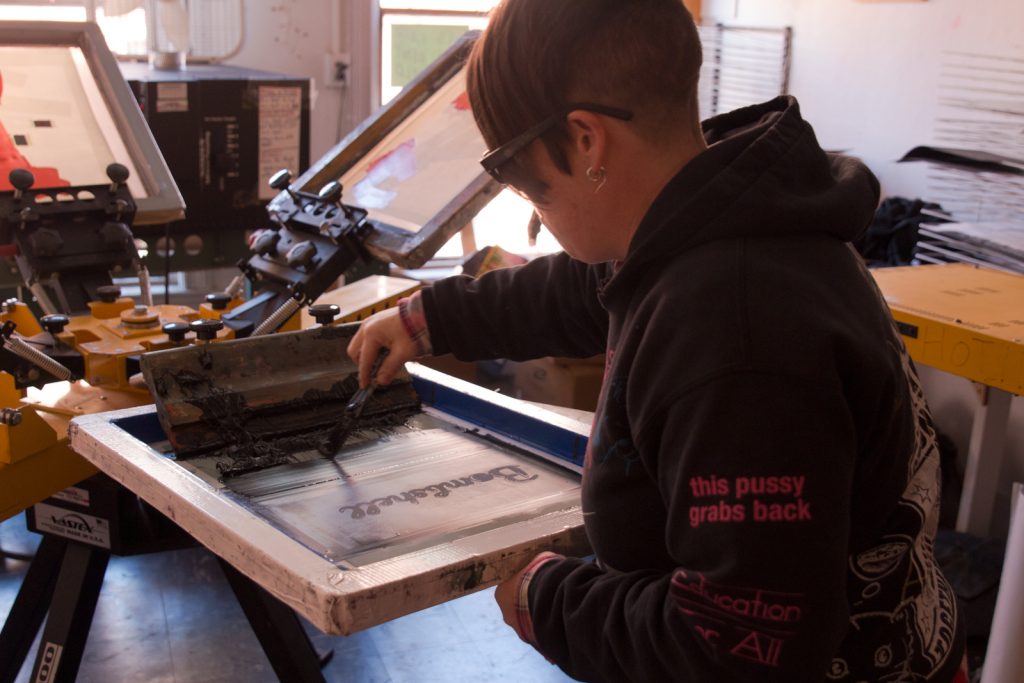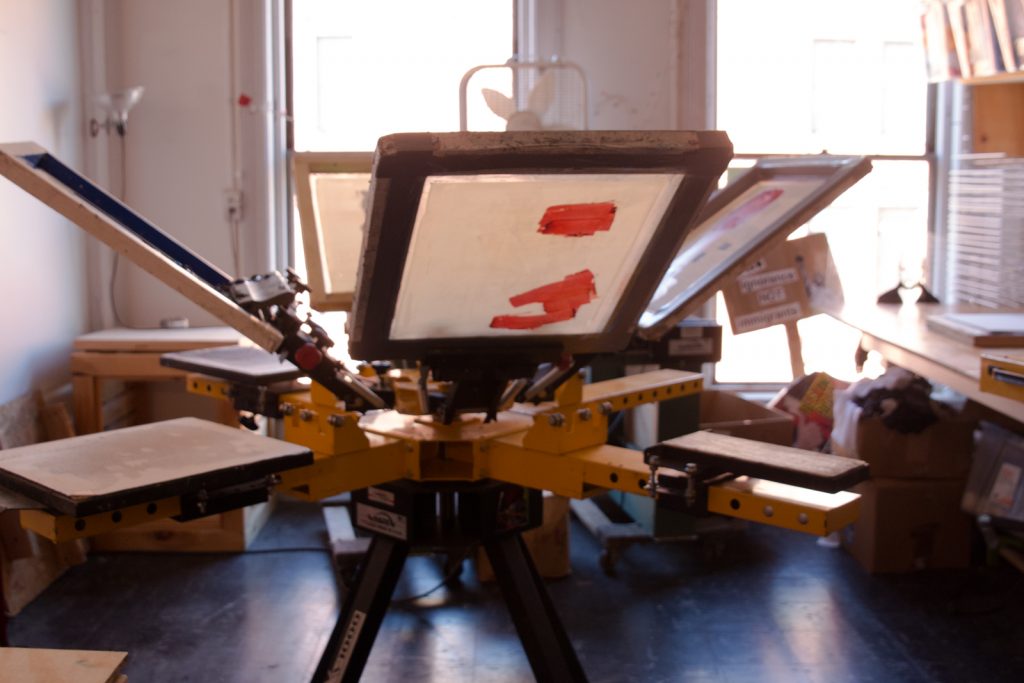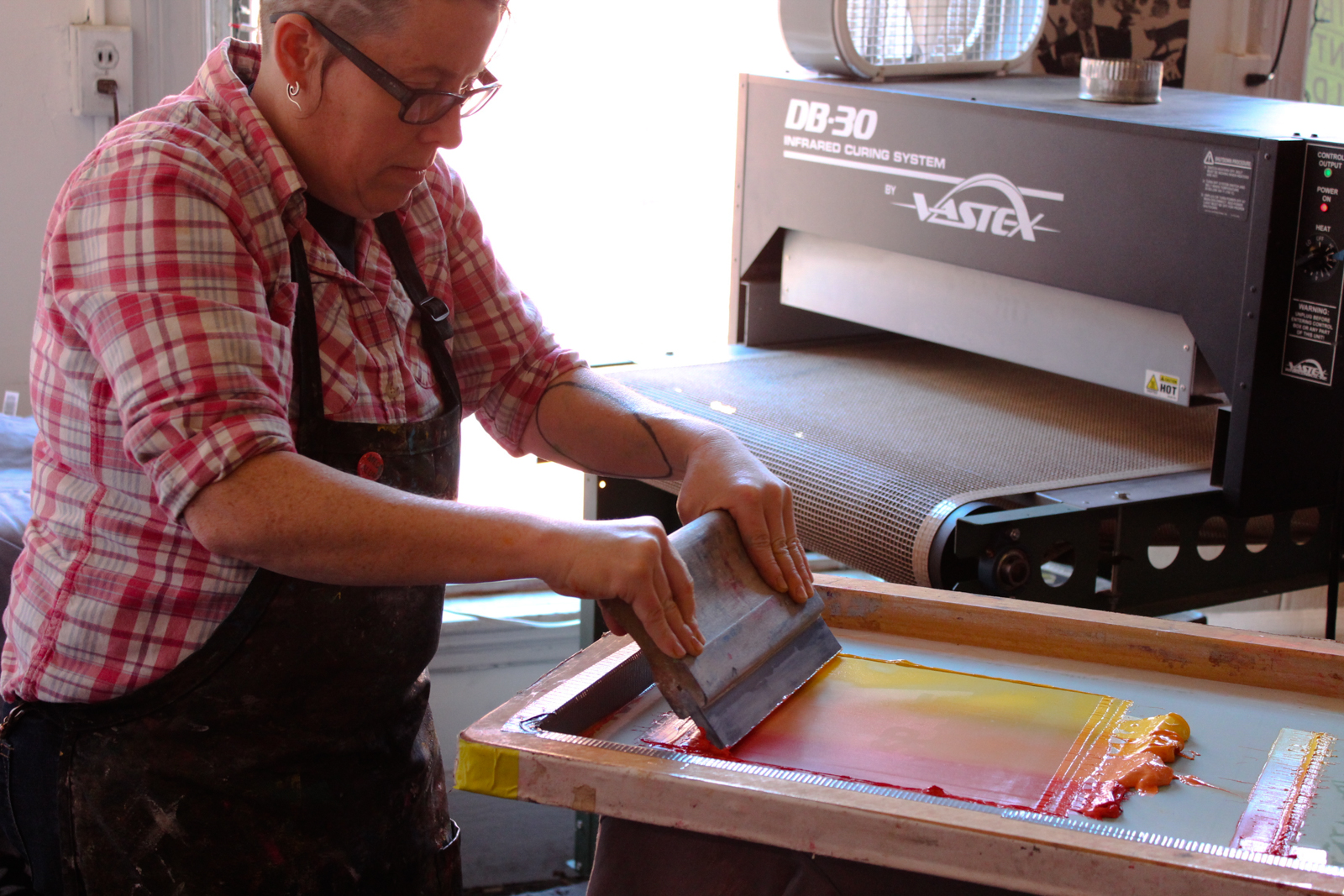Hope Rovelto is a woman, artist, business owner, educator, and great wedding dancer in Portland, Maine. Her screen printing business Little Chair Printing is based in SPACE Studios and is currently printing all of SPACE’s new apparel.
My name is Hope Rovelto and I just moved here from Philadelphia. I brought my business Little Chair Printing so I’ve been in kind of an educational, community t-shirt shop. Coming to Portland I really wanted to be part of Pickwick, or come into the community with the access of doing t-shirts and apparel. Cause having the equipment is really part of the battle. So I’m excited to be back in Portland. I haven’t lived here in fifteen years, so it’s been a bit, a lot has changed.
What is the experience of being in the community of artist studios?
Oh the experience? It’s exactly what I wanted. I mean I specifically sought out SPACE Gallery Studios, because, knowing that there was so many different types of artists in the building, and especially Pickwick. Pickwick seems to be the hub that, the fact that you can be a member and you can have access to all the equipment and do the events, there seemed to be kind of more of the social part of community studios, so you meet a lot of people and there’s lots of stuff. But then having an individual space means that I have my own space that I can produce some of my work but then open up the doors to other community members within SPACE, within Pickwick, and the community.
Can you talk more about collaborations either within Pickwick or within the building?
Since I offer, I have the equipment to make t-shirts, we can do t-shirts, tote bags, hats, I’m kind of bringing industry. There’s definitely a lot of screen printers which is great, so people know how to screen print. The part that I really want is that I want people to be able to use my equipment so that it becomes more of an education community studio. When I do my own stuff, I’ll probably do wholesale work to make some money, but it’s really, I want to show people that it is easier to print a t-shirt when you have the equipment, and that’s just, that’s how I see things, and you can produce a lot quicker and faster. So maybe that can help the community produce their own work in a faster way that they can bring money in or use t-shirts for fundraisers or events.

What are the types of nonprofits that you like to work with, or the populations within the nonprofit sector that you’re really drawn to?
Well in Philadelphia I was working with a couple organizations, they were Girls Rock Philly, which is an organization that empowers young women and girls to rock, basically play music. I was doing their posters and t-shirts and I do kind of political statement posters with them, so those are young girls from all parts of Philadelphia. And then another nonprofit I was working with, they were called Spiral Q and they deal with the population that doesn’t have a voice, so it could be going into communities because their city counselor wasn’t listening to the housing crisis, or education, or dealing with refugees, kind of understanding that community and welcoming them. So here in Portland they don’t have Girls Rock Philly but they do have some young, youth programs and I need to research a little bit more to put myself into these communities, so it’s like working with youth, any youth that are coming out of incarceration or youth that are just, they need some outlets.
What are similarities and differences of working within community here in Portland, Maine versus in Philadelphia?
The major one is just it’s a smaller community. So I was really, I was looking forward to that. Philadelphia is great, and there’s lots of different pockets, so I was part of so many different types of pockets throughout the city. Cause you have West Philly, South Philly, East, Northeast Philly, and so I was a part of a lot of nonprofits, but there’s a lot of travel, and there’s a lot of scheduling because it’s a larger city. And so, coming to Portland I think the same types of people, same groups, same types of nonprofits are here, it’s in a smaller distance location so to me that kind of means I could probably do a lot more. And I’m still keeping all my connections to Philly because I think it’s important to keep the network going so that maybe people here in Portland could have opportunities in Philly or vice versa. I kind of like that idea of expanding but within my own practice, I love the idea that I can walk to a good amount of studios or nonprofits and maybe get a lot more done. Cause it’s just a smaller proximity.
We’re in your artist studio space right now, how have you used this space, how have you modified it, how do feel like the physical space in here serves you and your art practice?
Oh I love the windows, so being here in SPACE I’m happy that I’m on the street side, so I can look down at Congress. I think it’s an ongoing project. Unfortunately I’ve been working at a job that’s been taking me away from the studio just for the fall, so I think just by building things, moving things, and figuring out how it fits, and I think it could keep changing cause I do want people to have access, so I need to figure out how a studio can be a community studio, so certain things need to be labeled and set so that anyone could walk in and understand where things are.
I’m really happy to be back, for sure. I was on the waitlist to come into SPACE for a while. Last year I kind of knew I wanted to be back here so I quickly signed up to be on the waitlist, and now that I’m here I’m excited to meet new people and to meet other printers, other shops, different communities. So I feel I’m fresh, like it’s kind of new still, so I’m really looking forward to understanding my voice within the community and see where that goes.

Julia Whyel is a Storyteller and Media Producer in New England. Her work focuses on themes of community, addiction, and vintage fashion. She loves watering houseplants, sending letters, and art that makes her cry, but not necessarily in that order. View her work here.

